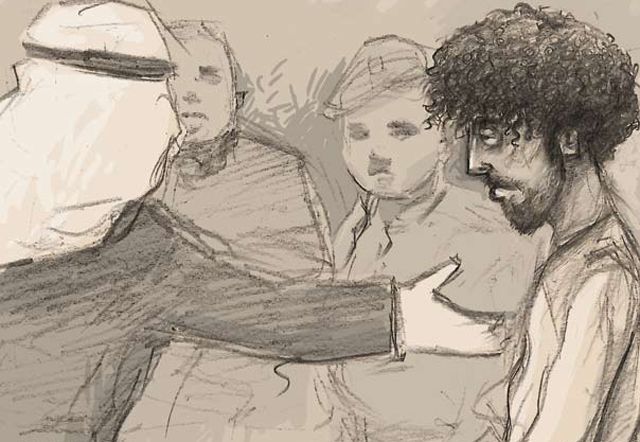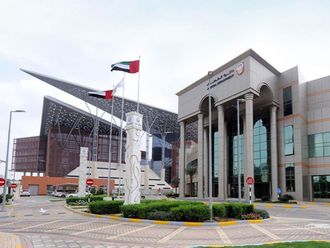Dubai : A courtroom drama unfolded when the prime suspect in the rape and murder of a four-year-old Pakistani boy made a tearful plea for mercy at the first court hearing on Wednesday which was held amid tight security. It was followed by the surprise announcement by his lawyer that he was quitting the defence.
R.R., a 30-year-old Emirati who was jailed in 2006 for three years in another rape case, entered court room number 4, head down wearing a grey long-sleeved shirt and black sports pants.
Tears of guilt
"I beg for mercy," R.R. said as he sobbed before Presiding Judge Fahmi Mounir Fahmi. He admitted he banged the child's head on the floor and strangled the boy, Mousa, on November 27, the first day of Eid Al Adha.
When Judge Fahmi asked R.R. whether he had planned to kill the victim, the suspect said in a low voice: "It was not my intention to kill the boy, but I panicked when he started screaming."
R.R. initially claimed the sexual act was "consensual".
"Did you plan to kill him?" the judge asked him again. R.R. just nodded his head.
More than 20 police officers, including five policewomen, were in the courtroom, while members of an anti-riot team were scattered around the court chamber, frisking people attending the hearing.
Heavy security
A police official justified the heavy security, saying they were anticipating a reaction from members of the Pakistani community inside the court. A Bahraini paper has reported that R.R. was born and raised in Bahrain to Pakistani parents before he moved to the UAE.
The only person present from the victim's family was Mousa's uncle, who sat quietly in the courtroom.
Forensic reports found semen inside the child's body. It also showed that the boy's lower lip, tongue and gums were ruptured. Investigators also found scratches behind his right ear and scars on the neck.
In an emotionally-charged courtroom scene, the defendant's court-appointed lawyer Hamid Al Khazraji from Ebrahim Al Mulla Advocates announced he was stepping down from the case.
Al Khazraji told the court: "Based on the detailed confession of the suspect and the details of his hideous crime which was committed in a sacred place on a holy occasion, I have decided to step down and not defend the suspect who brought shame to mankind."
In response, Judge Fahmi asked other lawyers in the courtroom whether any of them would volunteer to take Al Khazraji's place.
Mohammad Al Sa'adi, from Mohammad Al Sa'adi Advocates, stepped up addressing the court: "I speak on behalf of my colleagues that no one will represent the suspect if he does not confess his crime before the court."
The judge then told Al Sa'adi that the court would not force the suspect to confess.
"I advise him [the suspect] not to prolong the case and ask for God's and the court's mercy," Al Sa'adi stated. He then requested the judge's permission to approach the suspect, adding that if the suspect confessed to the crime, he would represent him.
Following his conversation with the suspect, Al Sa'adi said he would represent R.R., adding that he will study the case once he receives the file. He said R.R. expressed regret to the child's family.
A legal source said if a lawyer didn't volunteer to defend the suspect, the court wouldn't be able to issue a verdict. The source added that a false defence would easily be thrown out by the Cassation Court, Dubai's highest court, and the suspect may be freed.
Next hearing
According to court papers, R.R., who is unmarried, told the prosecution he had offered Eid prayer, visited his father's grave in the Al Qusais graveyard, and recited the Quran. He said he then heading back to his house and started drinking alcohol.
R.R.'s criminal record dates back to 1996 linking him to crimes such as forced sex with males, rape and theft.
The court will hear witnesses - including the two men who found Mousa's body and three policemen who conducted the investigations - in the next hearing on December 30.
Clarion call for child security
The Dubai Community Development Authority, a government body, has made the following recommendations for a ‘child protection policy' in the emirate:
- Establish a national child protection observatory body
- Establish a local child protection board or a committee
- Establish child advocacy groups
- Training of professionals working in the field of child protection
- Design appropriate evidence-based programmes
- Develop and adopt a child-to-child approach
- Establish an Ombudsperson office
- Design websites and hotlines for child protection
- Establish one-stop-shop integrated community centres
- Create specialised child protection units/officers
- Create child-friendly cities
(Source: Government of Dubai)













